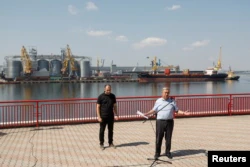Turkey is touting its recent success in brokering a deal to free up grain trapped in Ukrainian ports as a good reason why it should maintain close ties with Russia. Those relations are deepening further as Russian President Vladimir Putin has invited Turkish leader Recep Tayyip Erdogan to attend a Russia-China security alliance meeting next month.
Two more ships departed Ukraine for Greece and Egypt on Monday, carrying 30,000 metric tons of grain.
Since July’s Turkey U.N.-brokered deal with Russia and Ukraine, more than 600,000 metric tons of grain have been exported from Ukrainian ports. On Saturday, U.N. Secretary-General Antonio Guterres, accompanied by Erdogan, visited the coordination center that has been set up in Istanbul.
Speaking at a press conference, Guterres reaffirmed the importance of the grain deal.
“Getting more food and fertilizer out of Ukraine and Russia is critical to further calm commodity markets and lower prices for consumers,” he said.
Guterres said Ankara played a “pivotal role” in securing the grain export deal. With increasing numbers of ships leaving Ukrainian ports, Ankara portrays the agreement as a vindication of its policy of maintaining close ties with Moscow.
Political analyst Ilhan Uzgel of the Duvar news portal said: “Erdogan grabbed a role diplomatically, showing to the West that Turkey can be a useful actor in this region, mitigating the adverse effects of the food crisis globally. So, he is playing it domestically and internationally like he did before in many instances.”
In the past month, Erdogan has met with Putin twice, despite Western allies’ efforts to ostracize the Russian leader.
Ankara also refuses to enforce Western sanctions against Russia.
In a move analysts say is likely to sow further discord with Turkey’s NATO partners, Putin invited Erdogan to attend September’s meeting of the Shanghai Cooperation Organization, a Chinese-Eurasian security organization.
Galip Dalay, a Russia-Turkey expert at the London-based Chatham House, said Putin’s invitation and regular meetings with Erdogan are part of a broader Russian strategy.
“Putin’s telling the international community, ‘Actually, I am not as isolated as the West wants or portrays it to be.’ So, the symbolism of these [Erdogan-Putin] meetings and including Erdogan potentially joining the Shanghai Cooperation (organization) meeting in Uzbekistan, the symbolism is more important than the substance. And I think right now, Putin’s audience is the part of the West that is skeptical of a more heavy-handed policy towards Russia.”
Erdogan argues that maintaining close ties with Putin while at the same time having similar close relations with Ukrainian President Volodymyr Zelenskyy — with whom he held talks last week in Ukraine — puts him in a unique position to end the conflict.
Analyst Uzgel said the brokering of the grain deal underscores that Erdogan could play such a role, but only when the sides are ready to talk.
“If Putin decides to end the war, I don’t know if Ukrainians will concede to the presence of the Russian military there,” Uzgel said. “At that point, Erdogan may play a role. He has a chance. He is a good candidate to bring these sides together.”
Criticism of Erdogan over his ties to Putin from his Western allies have been muted. However, analysts say that silence will likely depend on whether Erdogan’s close ties to Putin can continue to deliver tangible results in at least mitigating the worst effects of the Ukrainian war.

